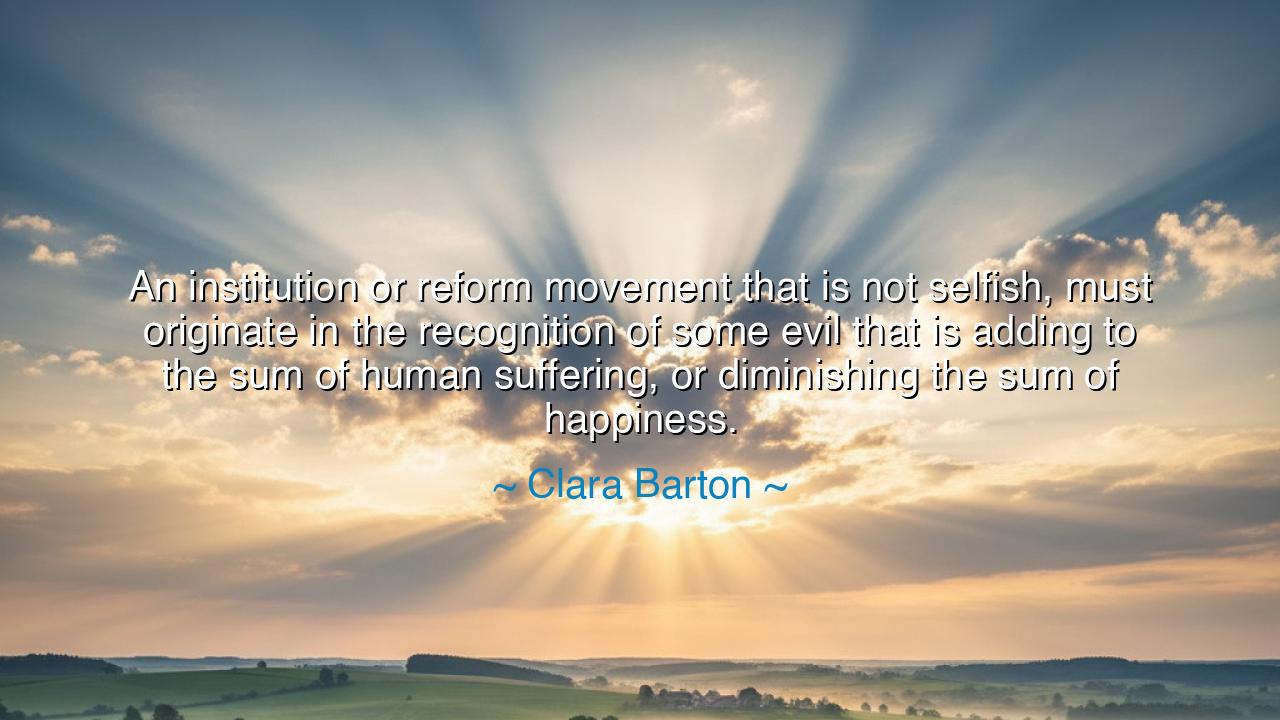
An institution or reform movement that is not selfish, must
An institution or reform movement that is not selfish, must originate in the recognition of some evil that is adding to the sum of human suffering, or diminishing the sum of happiness.






“An institution or reform movement that is not selfish, must originate in the recognition of some evil that is adding to the sum of human suffering, or diminishing the sum of happiness.” — thus proclaimed Clara Barton, the “Angel of the Battlefield,” whose compassion burned like a steady flame through the darkness of war and despair. In these words, she reveals the sacred root of all true reform—that it must spring not from vanity, nor ambition, nor the thirst for power, but from the recognition of human suffering and the moral courage to heal it. For the noblest causes are born not in comfort, but in compassion; not in theory, but in the trembling of the heart before injustice.
Clara Barton, the founder of the American Red Cross, was no idle dreamer of good intentions. She walked among the dying and wounded during the American Civil War, tending to the broken with her own hands. She saw horror unadorned—blood, hunger, the frailty of life—and from that abyss arose her conviction that only through confronting evil and suffering could true institutions of mercy be born. Her words remind us that reform, to be pure, must arise not from pride in doing good, but from a deep recognition of wrong that cries out to be righted. The foundation of every noble act is empathy—the ability to feel another’s pain as one’s own.
In her statement, Barton also warns of false reformers: those who seek institutions of glory, movements that wear the cloak of righteousness but serve only self-interest. A cause that exists to elevate its founder, a movement built to satisfy the vanity of its leaders—these are but hollow idols, destined to crumble. True service, she teaches, begins not with “I will lead,” but with “They are suffering.” The unselfish movement is one that kneels first, that sees a wound and cannot rest until it is bound, that feels another’s tears and moves to dry them.
Consider the story of Florence Nightingale, another woman of light born into a world of shadow. Like Barton, she was surrounded by luxury, yet her heart was restless. When she witnessed the misery of soldiers dying unattended in the Crimean War, she turned her back on privilege to tend the sick. Out of that recognition of evil—the neglect of human lives—she birthed modern nursing. Her reform did not spring from self-glory but from the sacred outrage that human happiness was being diminished by cruelty and neglect. Thus did one woman’s compassion transform the care of millions.
Barton’s wisdom touches upon a truth the ancients knew well: that goodness is reactive to evil, and that light exists to answer darkness. The philosopher Plato spoke of justice as the soul’s response to disorder; the prophets of every age have taught that compassion is the answer to suffering. To recognize evil, then, is the first act of righteousness. For he who refuses to see pain cannot heal it; he who denies injustice becomes its accomplice. Barton calls upon us to look unflinchingly at the wounds of the world—not to despair, but to act.
Yet her teaching also carries a deeper spiritual weight. The sum of human happiness, she says, is the measure of our civilization. Every time we ease one person’s burden, we add to that sum; every act of cruelty or neglect subtracts from it. Thus, every institution, every reform, every heart must choose its side in this great arithmetic of compassion. Will we add to the joy of the world, or to its pain? The answer lies not in grand speeches or noble slogans, but in the daily acts of mercy we dare to perform.
Therefore, let this wisdom be a torch for all who seek to serve: Do not begin with ambition—begin with empathy. Do not ask, “How can I be remembered?” but “Whose suffering can I lessen?” Walk the streets, listen to the cries, see where injustice dwells, and let that sight move your soul. The truest reform begins when one heart breaks open for another. It is only then, when our actions spring from love rather than pride, that we build institutions worthy of the divine in man.
And so, remember the lesson of Clara Barton—that every great cause begins with the recognition of human suffering and the will to restore human happiness. Look upon the world not with indifference, but with compassion sharpened by truth. For though evil is vast, even the smallest act of kindness diminishes its power. In this way, through the unselfish labor of the heart, each of us may help to heal the wounds of the world—and add, however humbly, to the eternal sum of its joy.






AAdministratorAdministrator
Welcome, honored guests. Please leave a comment, we will respond soon